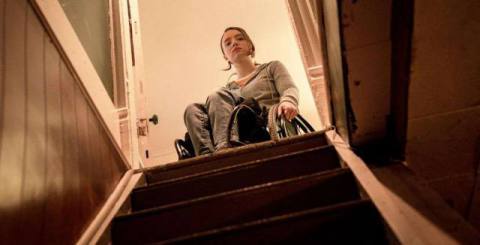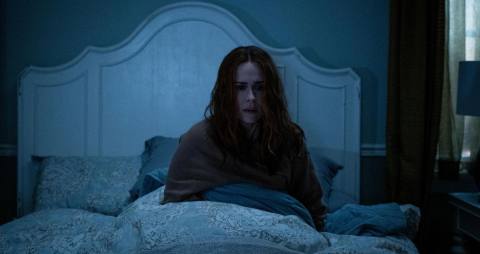About 15 minutes into Aneesh Chaganty’s thriller Run, a telling scene solidifies the fear that it’s going to commit the most grievous cinematic sin of all. A daughter who’s constantly sick, who takes fistfuls of pills every morning and night, and who has been in a wheelchair for as long as she can remember asks her mother one question about her medications. Her mother responds with a laughing diversion and deflection. At that moment, it becomes clear that Run isn’t going to follow the twisty-turny route of Chaganty’s previous film, Searching — instead, it’s going to be predictable. Run is exactly what you would expect if you read or watched Sharp Objects, read the Buzzfeed story about Dee Dee and Gypsy Rose or watched the Hulu miniseries about them, or if you just naturally suspect Sarah Paulson now, after her years of acting in Ryan Murphy’s increasingly outlandish projects. In spite of a few nail-biting sequences, Run is more of a slog than a sprint.
Chaganty and co-writer Sev Ohanian, teaming up again after Searching, give Run a sparsely effective setup. Three scenes in quick succession make plain the physical toll and potential horror of childbirth. A tiny baby lies on a hospital bed, hooked up to machines and surrounded by doctors. After a difficult labor, Diane Sherman (Paulson) fervently prays. When she finally sees her baby again, she presses her hand against the side of the incubator that’s keeping the little girl alive. Her face shows trepidation at first, then relief, then anxiety — a shifting array of emotion that reveals a certain single-mindedness. Diane is a mother, and nothing else matters to her more.
Years later, Diane remains devoted to Chloe (Kiera Allen), who survived her challenging infancy but has remained varyingly sick ever since. An intertitle shares Chloe’s myriad health problems: arrhythmia, hemochromatosis, asthma, diabetes, paralysis. To the other parents in her home-schooling group, Diane is outwardly boastful of her daughter’s accomplishments (“Chloe is the most capable person I know”), but they’re clearly codependent. Diane’s entire identity is tied up in being Chloe’s mother: dictating her school schedule, serving as her advocate to doctors, fetching her many prescriptions, tending to a sizable organic garden that provides all their vegetables.

And Chloe, understandably, relies on her mother for everything. There’s a snappy rhythm to the montage Chaganty uses to demonstrate this reliance: Chloe gets up every morning, maneuvers herself into her wheelchair, coughs up phlegm, takes her morning pills, eats the fresh organic breakfast Diane has cooked, gets to work on physics, literature, biology, and robotics, takes her afternoon pills, eats the fresh organic dinner Diane has cooked, and does her homework. It’s monotonous and unchanging.
The only potential surprise in Chloe’s life is whether she’ll be accepted by the University of Washington. If so, it will be Chloe’s first time out in the world on her own, which may be what sparks Diane’s reckless behavior. As Run progresses, the bond between mother and daughter transforms into an escalating series of reactions fueled by obsession and mistrust. What has been going on for years in this house deep in the woods in a small town, and when did it become a prison?
Unlike in the methodical whodunnit Searching, Chaganty and Ohanian don’t tiptoe around character motivations in Run, which makes for a surprisingly flat story. Torin Borrowdale’s score, decorated with genre flourishes like screeching strings and moody synths, adds a spooky vibe, but it can’t bear the burden alone. Some of the plot developments are initially unsettling, like Chloe’s internet being disconnected right when tries to research some of the pills her mother has provided.
But a little attention adds too much doubt to this narrative: Teenage Chloe has had access to the Internet for years, but never made a social-media account? She’s presented as being genius-level smart with robotics, but that same brain has never wondered about the claustrophobic insularity of her world with her mother? She’s never thought about pursuing a romantic relationship, or wondered why her mother has never introduced her to other children, or encouraged her to make friends? There is a disconnect in Run between how competent and intelligent Chloe is vs. how long it takes her to act in her own self-interest, and probing too much at that divide makes Run’s plot seem a little goofier than it should be.
The performances are the film’s strongest assets, with the action sequences close behind. Although there are cheeky moments throughout (a reference to Stephen King’s Derry, Maine, and a movie Diane and Chloe go see called Breakout), Paulson and Allen play most of this fairly straight. That directness adds needed tension, helping align the audience with Chloe’s realization that something isn’t right with her mother, and revealing the depths of Diane’s villainy.

Allen is wonderfully emotive, and funny when the film allows, like when she cuts off the family pharmacist with an exasperated “I know what confidential means, Mrs. Bates.” Chaganty’s choice to often frame her in stark close-ups where she’s the only figure onscreen amps up the primal feel of her shocked, horrified, and ultimately vengeful reactions. The second half of Run demands significant physicality from Allen, and her full-body commitment hammers home the urgency of these sequences. The scenes where Chloe is unraveling the mystery of her mother are most in line with the cleverness of Searching, although there is an anticlimactic feeling to her discovery, given how far ahead of her the audience will be.
In spite of the staleness of Diane’s character, Paulson’s performance is enjoyably ferocious. Between various installments of American Horror Story and the One Flew Over the Cuckoo’s Nest prequel Ratched, Paulson has cultivated an ability to turn on a dime, transitioning effortlessly and unnervingly between calm reassurance, fragile anxiety, and volcanic anger. That mercurial quality defines her work in Run, which requires Diane to leverage all the compassion and sympathy society easily affords to white women — and exploit it for her own agenda.
The dynamism of her introductory hospital scene, where Diane vacillates between concern and mania, lingers on throughout the film. It underscores how often this character uses victimhood as a shield; Paulson does well with passive-aggressive guilt tripping and put-upon martyrdom. Her snarling rage when she yells at Chloe for the first time is a real “You in danger, girl!” moment, and she somehow makes a statement as innocuous as “I’ve got you” sound like a bone-chilling threat. But Paulson’s crazed manipulations are underserved by a narrative that collapses under the slightest scrutiny, and even a surprisingly nasty final scene can’t fully make Run stand out from the steadily expanding Munchausen-syndrome-by-proxy subgenre.
Run is streaming on Hulu now.
